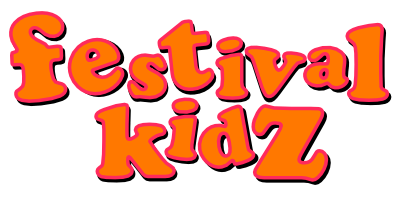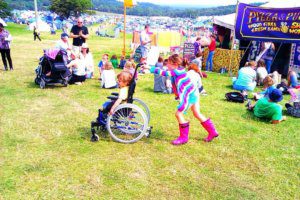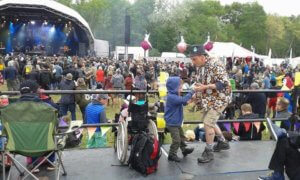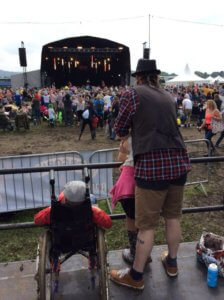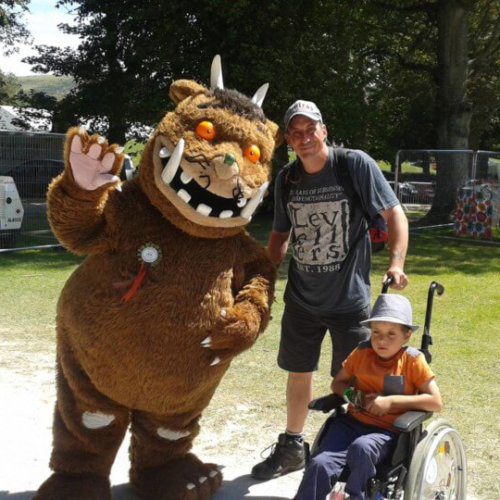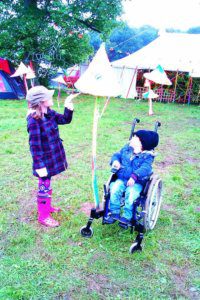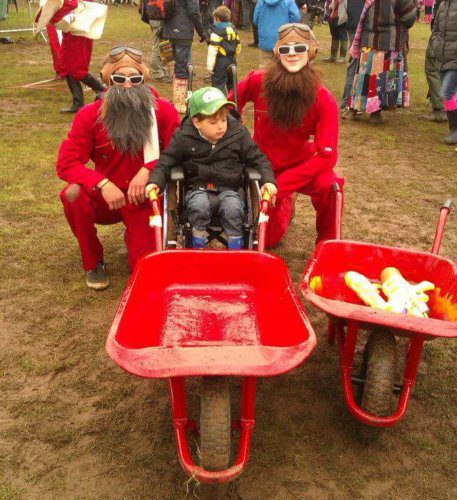Most festivals do what they can to be accessible to as many as possible. After all, they want to be popular, and to exclude people from attending would obviously result in less ticket sales!
My experience of accessibility at festivals is as a mother of a (now) eight year old boy with spina bifida and hydrocephalus. From the spina bifida, he is a part time wheelchair user. The hydrocephalus has crossover symptoms with high functioning autism, meaning that some social situations are stressful (and ear defenders are a must).
Our first festival was Beautiful Days in 2011 when he was three years old. We had a great experience (after doing a lot of homework beforehand about access). Our family haven’t spent a summer without going to a least two festivals since. These have included Beautiful Days again (twice), Bearded Theory (twice), Chagstock, Wychwood, Camp Bestival (five times), The Great Dorset Steam Fair, England’s Medieval Festival and several small ones that we have just visited for single days without camping.
Our family enjoys the whole experience of camping, being outdoors, the huge spectrum of activities on offer, the music and the relaxed atmosphere and common attitude that everyone is accepted.
Free Carer’s Pass
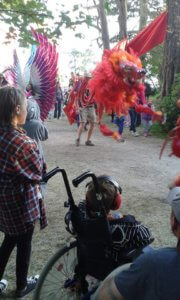
Most, if not all festivals offer a complimentary companion’s ticket to each disabled ticket holder, on provision of evidence such as a DLA letter.
Some festivals put a restriction on this to only include disabled guests that are aged sixteen years or older. The reasoning being that all minors have to be accompanied by a ticket bearing adult anyway so why discriminate? Therefore it is worth checking with each festival.
Camp Bestival does not have this restriction, which meant that the first year I went with the children, it didn’t actually cost me anything for the tickets! My husband was working, so I went for the weekend with just my two children. Their tickets were free on account of their ages at the time. Camp Bestival have since increased their prices, but it is still great value.
Accessible Camping
This a now generally a given at festivals that are large enough to require it. I have been to some smaller and tiny festivals that did not have a separate camping area. Examples include Summer Solstice Festival and East Sussex’s Magical Faerie Festival. However, it did not end up being an issue as they were such small festivals that this facility was not necessary.
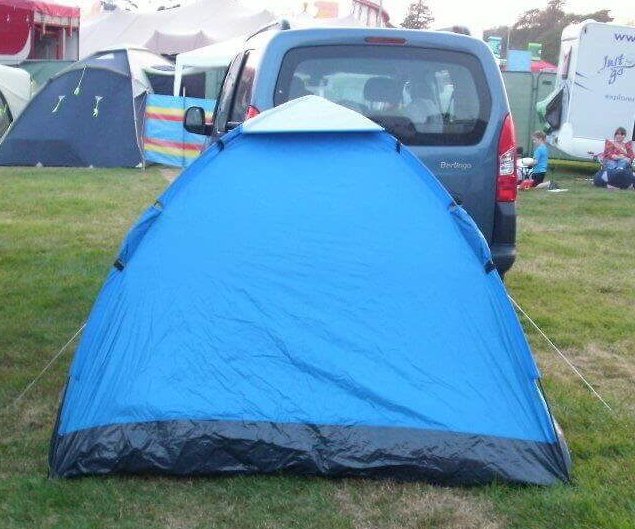
Accessible camping normally needs to be applied for in advance. This field will often fill up very quickly so it is a good idea to apply as soon as tickets have been purchased. Evidence such as a scan of a blue badge or DLA letter is often required. A few festivals accept membership to a scheme such as the Access Credibility Card.
The accessible camping area is usually relatively flat. There are normally a lot more showers and toilets per head than the other camping areas. Some festivals will have this as the nearest campsite to the main festival site.
Others have it located in the quietest area available. Some even manage to combine the two, by having the accessible camping near one entrance (often to the kids’ field), while the rest of the camping areas are by another entrance. It is important to check the site maps of individual festivals if your family has specific needs in terms of camping requirements.
There is normally a fridge in the stewards’ tent that can be used to store medicines. Also, many festivals will offer an electrical hook up if required for medical reasons. In my experience these facilities are offered on the accessible camping application form. If not, then we just get in touch with the festival beforehand if either will be needed.
Parking
In accesible camping, it is often possible to park your car next to your tent (which I love!) Otherwise disabled parking should be nearby. Some festival’s will require a blue badge for this, so it is worth checking first.
Occasionally festivals allow all guests to drive to the campsite to unload, before heading to the car park. Of course this option isn’t offered at larger festivals due to safety reasons.
Viewing Platforms
As a matter of course, festivals commonly provide viewing platforms for at least the main stage. They are located at the back of the viewing area, and raised high enough to provide a good view over the rest of the crowd.
This is a much calmer and more civilised way of watching a performance. Stewards chiefly police these areas. Access is (as a rule) officially limited to the disabled guests along with one carer each.
In most cases, platform passes need to be requested in advance, when applying for a carer’s pass and accessible camping. When the platform is quiet, however, the steward will usually allow on other members of the family. This is of course at the discretion of whichever steward is manning the platform.
Smaller stages, for the most part, will not have this facility. In this case, I usually find that the optimum viewing experience is obtained by staying at the back.
More often than not, there is a slope down to the stage, in addition to the stage being raised. This also has the benefit of having an easy escape route if the act doesn’t live up to expectations, or if the crowd gets too much, or if we need a sharp exit for any number of other reasons!
Facilities Across The Site
It is common for festivals to provide accessible toilets alongside every set of chemical toilets.
Unfortunately it is also common for many people to disregard the fact that the use of these toilets is specified. A good deal of polite assertion can be very helpful here.
Some festivals start with a suggestion that a code will be needed to gain entry to accessible facilities, but in my experience this is not followed through. I normally prefer to just use the campsite toilets when we go back for a break but of course this is not always practical.
Quiet Time
We go to festivals for the almost unlimited range of activities. The different shows cover music, theatre, comedy and much much more. There are usually many craft activities on offer including bushcraft, art and science experiments. Festivals are amazing for the variety of play areas and have-a-go circus skills. Sometimes however we just need some time out.
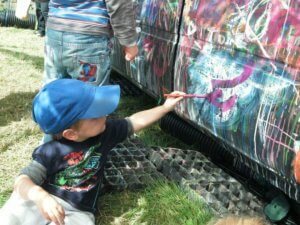 Going back to the tent is the most obvious option for a break. This is necessary at times for every family, but nobody wants to waste too much festival time.
Going back to the tent is the most obvious option for a break. This is necessary at times for every family, but nobody wants to waste too much festival time.
There are quieter and noisier areas at every festival. It is unusual for a festival not to have a holistic/healing area, which by its nature is a chilled space. At our first festival both the children enjoyed a painting van! A couple had painted their van matt black. They provided paints and chalks and invited children to get creative. It was a wonderful and simple idea – so much fun.
We often find that taking a breather at the back of a stage tent during a non-music act will get us back on track. Alternatively, a large number of festivals boast a beautiful wooded area. This may include a stage, a play area, and/or a space for woodland crafts. Each family has their own preference for chill out time, but this tends to be ours.
Wheelchair Access
Mud and Hills are the main issues here.
Smaller venues that are open to the public in their main capacity as a tourist attraction throughout the year tend to have the best access.
Wychwood is located at Cheltenham Race Course and was great for mobility access. It was flat and there were paths to get almost everywhere. England’s Medieval festival is at Herstmonceux Castle (which will also play host to the Sun and Moon Festival in 2017). This is also ideal for the same reasons if attending as a day visitor. Both events have less weekend campers so, although you are able to camp right near your car, there is no specific accessible camping area or facilities meaning it’s worth pitching near the entrance to avoid hills and potential mud if the weather turns.
Nearly all festivals are in fields. On the whole, temporary roads and pathways are laid out ensuring ease of access from one area to another. Whilst these are adequate when there is a moderate amount of rain, if there is a persistent downpour then unfortunately the weekend can be a write off for wheelchair users. As festivals are held in the summer months, this is a rare scenario. Out of fourteen (I think) festivals where we have camped, we have given up twice. Having said that, on both occasions we lasted until late Saturday or the Sunday, and may have perservered if my parents hadn’t lived five miles away offering warmth, comfy beds and plenty of TLC. My husband and daughter stayed to play, not needing to cut their weekends short.
Some of the festivals we have been to have been a bit hilly, which is hard work but good exercise. It is always worth finding out in advance if the site will be be manageable.
Food
Medium and large festivals do on the whole cater for pretty much every taste. We always take a camping stove and plenty of non perishables, but I love the diversity of food on offer, and will treat myself to as many festival meals as our budget allows.
I always go in hope that the children might improve their dietary repertoires, and I still hope that they will. Festival food is pricey though.
Overall
Festival organisers do seem to be doing more and more to make their events accessible to all. There is still plenty of room for improvement – for example, I am yet to see a sign language interpreter, or any braille on signs.
Every family is different and all children have different needs. On the whole though, for my special family, festivals are a great break from everyday life, and always lift our spirits. I don’t think I could imagine a summer without festivals.
